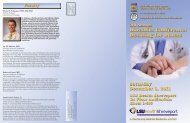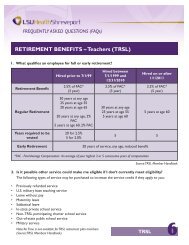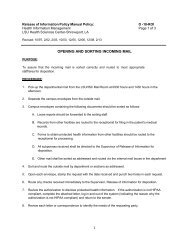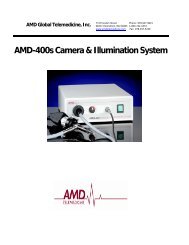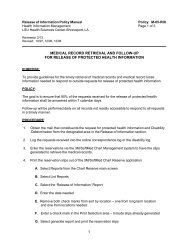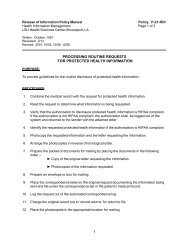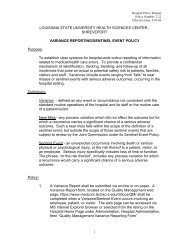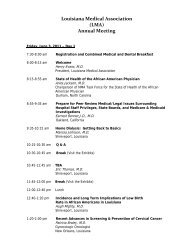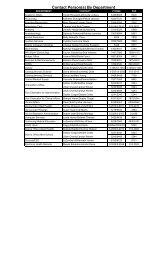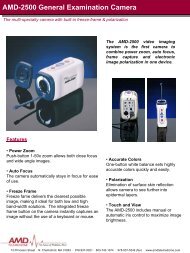School Of Medicine - LSUHSC Medical Communications Home Page
School Of Medicine - LSUHSC Medical Communications Home Page
School Of Medicine - LSUHSC Medical Communications Home Page
Create successful ePaper yourself
Turn your PDF publications into a flip-book with our unique Google optimized e-Paper software.
86 LSU Health Sciences Center at Shreveport <strong>School</strong> of <strong>Medicine</strong><br />
At the first level, after receiving a written appeal stating the basis<br />
for the dissatisfaction and the relief sought, the head of the teaching<br />
unit shall, within a period of ten working days, review the appeal,<br />
meet with the student and, if he/she deems appropriate with faculty,<br />
and formulate a written response which shall be given to the student.<br />
If the student remains dissatisfied with the grade or evaluation<br />
after receiving the response to his/her appeal from the teaching<br />
unit head, the student has five working days from the receipt of the<br />
response to make a final appeal, in writing, to the Assistant Dean for<br />
Student Affairs, who will compile the data and present it to the Dean.<br />
The written appeal must include the basis for the dissatisfaction<br />
(clear deviation from the grading procedure used for other students<br />
or the distinct unfair nature of the grade received) and the relief<br />
sought. The Dean will then render a decision. Addressed will be<br />
(1) whether or not the evaluation or grading procedure used in that<br />
case was essentially the same as used for all other students in that<br />
course and (2) whether or not there is evidence of capricious, unjust<br />
or erroneous evaluation sufficient to warrant referral of the case<br />
back to the department for reassessing the students’ competence.<br />
Using these criteria, the Dean will either accept the original grade<br />
or evaluation as valid or refer the case back to the department or<br />
teaching unit for reevaluation and/or grading of the student. If the<br />
decision reached requires changes in an official university record,<br />
the faculty of the department or teaching unit must comply with all<br />
university regulations and procedures necessary to accomplish<br />
the change. The decision of the appeal reached by the Dean,<br />
represents the final level of due process for appeal of a final course<br />
grade in the <strong>School</strong> of <strong>Medicine</strong>.<br />
Promotions<br />
Student’s qualitative and quantitative academic progress will be<br />
assessed for academic advancement or retention at least at the end<br />
of Module I and at the end of each year. Technical standards may be<br />
assessed at any time.<br />
A passing grade or the successful remediation of a failing grade<br />
must be earned in all courses for a student to be promoted and to<br />
graduate. The earned grade of F is not removed from the transcript<br />
or GPA calculation, although successful remediation is noted. Course<br />
directors and teaching faculty determine the remediation plan and<br />
assessment instrument.<br />
Repeating First Year and Second Year<br />
Students may repeat only one of the first two years of medical<br />
school. If the student earns criteria which would necessitate<br />
repeating a second time, the student will be dismissed. A student who<br />
is permitted to repeat the first or second year must submit a specific<br />
and acceptable proposal for study to the <strong>Medical</strong> Curriculum Council<br />
(MCC) and successfully complete it in order to be eligible to retake<br />
the first or second year. The proposal and any additional stipulations<br />
made by the MCC must be fulfilled by the student. After repeating a<br />
year, the student must achieve automatic promotion (defined as 2.00<br />
and no F’s) in future years, or be dismissed.<br />
Remediation<br />
Remediation for Module I courses must be completed before<br />
advancement to Module II. Remediation for Module IIA (first year)<br />
courses must be completed before registration for the sophomore<br />
year. Remediation for Module IIB (second year) courses must be<br />
completed prior to registration for the third year. The remediation<br />
time frame for third and fourth-year clerkships will be recommended<br />
to the promotion committee by the clerkship director. Students may<br />
remediate the grade of F in one course; at any time students earn two<br />
F’s (including a successfully remediated F), they shall be dismissed.<br />
Academic Actions for Failing Grades<br />
An F may be earned by a student based on academic, professional,<br />
and technical standards or as a result of failure to complete required<br />
course work in a timely manner. Except as modified by prior repeating<br />
or for students who are required to meet criteria for automatic<br />
promotion, the following summarizes academic action taken when<br />
the grade of F is earned.<br />
As judged at the end of the first half of the first year, students may<br />
remediate one F; Students who fail to successfully remediate an F shall<br />
be dismissed. Students earning two F’s shall be dismissed. If at any<br />
time, when judged at the end of each half of the first two years or<br />
at any time in the third or fourth year, students who earn a second F<br />
(including a previously successfully remediated F) shall be dismissed.<br />
STATEMENT OF SATISFACTORY<br />
ACADEMIC PROGRESS<br />
A student allowed to continue enrollment in the <strong>School</strong> of <strong>Medicine</strong><br />
is considered making satisfactory progress. Student promotions<br />
committees meet at least at the end of each academic year (and<br />
usually more often as needed) and review qualitative and quantitative<br />
academic progress of each student. A student not satisfactorily<br />
completing all course requirements may be permitted to remediate<br />
and may be required to repeat an entire academic year of study. Each<br />
student must complete the four-year curriculum in no more than six<br />
calendar years after initial enrollment. The time granted a student for<br />
a leave of absence will not be included in the maximum time period<br />
for completion of the program. Additionally, a student allowed to start<br />
the senior year with incomplete junior-year rotations will be treated as<br />
a senior when determining the student’s Cost-of-Attendance for next<br />
years award.<br />
Dismissals<br />
Students may be dismissed for failure to meet academic,<br />
technical, discipline, and behavioral standards.<br />
Behavior Dismissals<br />
As future physicians, medical students should be aware that they<br />
are held to a high standard of behavior and professionalism. In the<br />
context of medical training, <strong>LSUHSC</strong> in Shreveport has an obligation<br />
not only to itself to maintain the integrity of its degree but also to<br />
protect the public interest. Technical Standards for behavioral and<br />
social attributes evolve as students move toward patient care. In the<br />
earliest stage of medical school, they may also include demonstrating<br />
a commitment to learning which includes attending assigned classes,<br />
meetings and examinations, and treating classmates, teachers,<br />
faculty members, and patients with respect. Failure to meet these<br />
standards will also be considered by student promotions committees<br />
in their reviews of students.<br />
Academic and Technical Standards<br />
Dismissals<br />
Promotions committees recommend to the Dean the dismissal<br />
of students who fail to meet the academic standards for promotion<br />
described in the Student Promotions Policies of the Faculty or the<br />
Technical Standards for Admission, Academic Progression and<br />
Graduation described in this catalog/bulletin.<br />
Disciplinary Dismissals<br />
In the event of Honor Code violations requiring the action of a<br />
Hearing Panel, their recommendations are forwarded to the Dean. The<br />
LSU <strong>School</strong> of <strong>Medicine</strong> Shreveport Student Honor Code, approved<br />
by the General Faculty on May 15, 1990 and revised on May 20, 1997<br />
is published annually in the <strong>LSUHSC</strong> Shreveport <strong>School</strong> of <strong>Medicine</strong><br />
Handbook (available at http://www.sh.lsumc.edu/student-affairs.)<br />
Student behavior must conform to the Honor Code expectation.<br />
Appeal of Dismissal<br />
Appeals of dismissals concerned with academic or technical<br />
standards are discussed here. Appeals of disciplinary dismissals<br />
are covered under Student Honor Code in the <strong>LSUHSC</strong> <strong>School</strong> of<br />
<strong>Medicine</strong> in Shreveport Handbook (available at http://www.sh.lsumc.<br />
edu/student-affairs).<br />
A student dismissed from the <strong>School</strong> of <strong>Medicine</strong> may appeal<br />
the dismissal decision. The appeal must be made in writing to the



